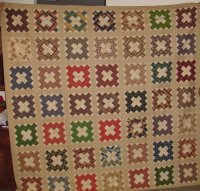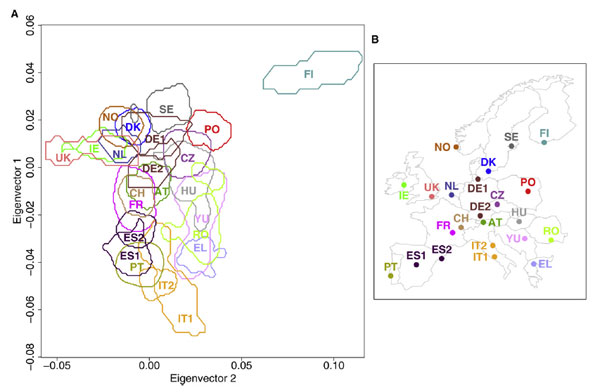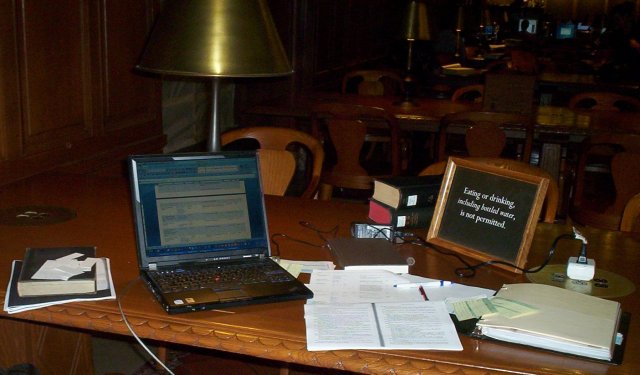Article 1, Section 2 of the U. S. Constitution lays the groundwork for conducting a periodic census in order to provide proportional representation in the House of Representatives.
The House of Representatives shall be composed of Members chosen every second Year by the People of the several States.... Representatives and direct Taxes shall be apportioned among the several States which may be included within this Union, according to their respective Numbers, which shall be determined by adding to the whole Number of free Persons, including those bound to Service for a Term of Years, and excluding Indians not taxed, three fifths of all other Persons....
This was modified somewhat by the 14th Amendment, to wit (More)
I had to watch it, since my genealogical organizations, websites, and contacts kept bringing it to my attention: NBC's new genealogy show, Who Do You Think You Are? My reactions? Mixed.
Each week, apparently, the show will present an investigation into the family history of one person. Supposedly these are famous people; I haven't heard of any of them, but that helps me concentrate on the data, which I find more interesting anyway. (More)
UPDATE: The Second Edition of Phoebe's Quilt, corrected and expanded, is now available.
 My sister-in-law found it in a trunk: an old, handmade quilt. Each block was inscribed with a name, often a city, and sometimes a Bible verse. The cities and many of the surnames were familiar, but no name was identifiable as that of someone in the family. Who were these people? Whose quilt was it, and when was it made? And how did it end up in Prudence's trunk?
My sister-in-law found it in a trunk: an old, handmade quilt. Each block was inscribed with a name, often a city, and sometimes a Bible verse. The cities and many of the surnames were familiar, but no name was identifiable as that of someone in the family. Who were these people? Whose quilt was it, and when was it made? And how did it end up in Prudence's trunk?
Far be it from me to resist a genealogical puzzle, especially when it can be turned into a Christmas present: I would use my genealogical resources to decipher the quilt, and turn my research into a book to put under the tree. Little did I know how much of my life this little project would consume; I'm certain the quilt itself was completed in less time.
Did I say completed? I doubt I've ever used that word in a genealogical context unless accompanied by "not" or "never." But Christmas will come whether or not we are ready, and thus I was saved from my perfectionist tendencies. The project is as done as it is going to get, barring a second edition. (More)
Like many people, I have mixed feelings about Facebook, finding it simultaneously useful and annoying. But here's a funny thing about Facebook, as reported by Eric Schultz, who is the Chairman of the Board of the New England Historic Genealogical Society and writer of The Occasional CEO. (The NEHGS library, both online and in person, is one of my favorite and most helpful resources for genealogical research.)
This last summer, in the midst of its 164th year, NEHGS had the single greatest month of membership growth ever. Ever.
The reason? Facebook.
Yep, that surprised the board, too.
If you were given an unexpected two weeks in New York City (actually 8.5 weekdays), how would you spend them? Not the way I did, it's a safe bet. While I did manage one or two obligatory tourist trips (more on that later), most of my time was spent at the New York Public Library—you know, the place with the magnificent lions out front, where everyone goes who wants to film something in a library because it's so beautiful. Though in truth I never saw the main part of the building. I made my home in Room 121, the Irma and Paul Milstein Division of United States History, Local History and Genealogy. One of the best resources in the world, a perfect complement to my beloved New England Historic Genealogical Society Library in Boston.
As with February's research trip to Boston, this was an intense time. I estimate I spent 40 hours of those eight and a half days in the library itself; it turned out to be more blessing than bother that it didn't open till 11 a.m., as I needed the morning time to prepare. The library is less than half a mile, a mere eight minute walk, from the Times Square Hilton hotel where we stayed, and what a pleasure it was to sling on my backpack, descend via the Hilton's two elevators to 42nd Street, walk past Bryant Park, and enter the cool, dark research room with its intoxicating smell of old books; then to re-emerge—after gentle prodding by the librarians, who reminded me that the building was about to close—and reverse the trip with a head swimming with new data, and my sweet, hard-working husband and a late dinner to look forward to.
Researching, writing, sitting for hours at a desk poring over books—that which was anathema during my school years gives me such great pleasure now. Who'd have thought?I never could keep cousins straight. First cousins—the children of my parents' siblings—I understood, but I was lost when it came to second and third cousins, let alone those with the "removed" designation. Not that I cared; it was rarely an issue for me. When genealogy entered my life, however, family relationships suddenly needed to be a whole lot more specific.
After much puzzing over confusing definitions and tables, I gained enough head-knowledge to create the following algorithm. My gut instincts in the matter are still a bit fuzzy, so I fall back on the strategy of the confused high school algebra student and rely on formulas. (More)A common theme over at the Front Porch Republic is a respect for place: for home and community, for not only eating locally but being locally, staying in (or returning to) one's hometown rather than venturing off to "better" places. The article Root Hog or Die is where I chose to ask a question that has been bothering me about this approach to life, much as I like some of the ideas. (More)
My great-great-great-grandfather, Nathan Smith, was born in County Tyrone, Ireland, in 1770. His mother died when he was six or seven years old and he was sent to school in Dublin. At the age of 23 he emigrated to the United States. Here is part of his story, as told in excerpts from a manuscript written by his grandson, James Foster, around 1890.
He sailed from Movill Bay in the year 1793, and landed in Philadelphia after a voyage of thirteen weeks on the water. The ship was commanded by a Captain Lovell. Grandfather was prostrate with yellow fever at the time. The ship was condemned and forbidden to enter the harbor. The Captain swore he would land Smith...there or somewhere else worse. Grandfather was taken to the hospital in a very feeble condition, so feeble that he did not expect to recover. But a woman attending the sick cheered him up by telling him she was going to have him for her second husband!
Both Porter and I are fortunate in having many ancestors who were amongst the first Europeans to come to this country. Whether it’s a fortunate situation in general may be up for debate, but for one doing genealogy research it is an undeniable blessing. For one thing, those early New Englanders kept good records! I didn’t know how good until I tried to find ancestors in Pennsylvania, where keeping birth records wasn’t generally required until the 1900’s. Even next-door neighbor New York isn’t nearly as easy to research as New England, and the further west one travels, the worse it gets. Except for California, that is. California may not be so good with history, but its modern-day records are more open than most. As a person concerned with privacy this makes me nervous, but the genealogist in me is grateful.
The second reason for being happy to have early New England ancestors is that so many other people have researched those lines already. In many cases, all I have to do is find the right books. That’s not as easy as it sounds, but it is what has enabled me to trace our lines so extensively. (More)I'm trying to digest and document the genealogical data I gathered during my recent visit to the NEHGS Library in Boston. There's much too much to handle all at once—and too many other duties calling—but I am focussing at the moment on getting into publishable form some significant progress I made on one of Porter's lines.
This line includes the first set of Welsh ancestors I've found for Porter. He's happy with them, even though he worries that Wales is uncomfortably close to Ireland. He's afraid I'll eventually find Irish ancestors in his tree—not that he has anything in particular against Ireland, but because he will no longer be able to blame my quirks on my Irish blood. :)
These Welsh ancestors are making my head spin. I have Welsh lines, too, but haven't yet tried to carry them back beyond the immigrants. This line of Porter's goes much further into the past, well into the time—which actually isn't all that far back—when Welsh names followed a patronymic system rather than having fixed family surnames. So I am struggling with names like Gruffyd ap Einion of Gwyddelwern ap Gruffyd ap Llewellyn ap Cynrig ap Osbern Wyddel of Cora y Gedol. Granted, one gets a lot of genealogy worked into a name that way, but entering it into standard genealogy software is a bit of a challenge.
I think I'll go clean the house.After all the travelling we did in the last quarter of 2008 and in January of 2009, I, the homebody, was really ready to enjoy a few months with nowhere to go. But "the best-laid schemes o' mice an' men gang aft agley," and in this case I'm thrilled.
Ever since we moved away from Boston, I'd been waiting for Porter to get a job assignment back there so I could stay with him while doing research at the New England Historic Genealogical Society Library on Newbury Street. He's been all over the country, but never to Boston...until now. (More)
One of my great-great grandmothers, on my mother's side, bore the name Juan Fernandez Pritt. In various census records she is listed as Penandis, Permandus, Joana P., Juann P., Joanne, and Pernandis E. Even though one of the most thorough researchers in the area found her listed as Juan Fernandez in the Weston, West Virginia courthouse, who can blame him, and others, for assuming that was an error and calling her Joanna? Even her middle name would be in question because of the census data.
I'm convinced, however, that Juan Fernandez is her correct name, although she was no doubt called by one or more nicknames throughout her life. The name in that form shows up in a published biography of her eldest son (my great-grandfather), and also on his official death certificate, bizarre as it seems for a child born in the backwoods of West Virginia, with no Hispanic relatives in sight. (More)Trying to catch up on my e-mail backlog, I came upon the World Names Profiler through my NEHGS newsletter. "The site plots 8 million names, using data that comes from electoral rolls and telephone directories around the world. Covering 300 million people in 26 countries, users can see where certain surnames originated, and where they have migrated to."
Here, for example, is the Wightman distribution map. (More)No time for something more thoughtful at the moment, but I saw this and can't resist passing it on. Check out this genetic map of Europe, and read the New York Times article that goes with it.

I recently read the answers to a genealogist's request for people's "top three genealogical regrets," and discovered that I am not alone. Hands down, the greatest frustration and sorrow reported was over not recording stories and asking questions of those who died taking irretrievable history with them. I'm far from the only one who developed an interest in family history too late to get easy and accurate answers to the family mysteries that are now taking so much time and effort to unravel, and which may never be made clear. From bare-facts birth, death, and marriage information, to photographs of people and places once dearly loved by those whose love made us what we are, to the unique, intimate, and irreplaceable stories of a family's daily lives, thoughts, feelings, and culture—these personal connections with history all too often mean little to the young, engrossed as they are in the here and now.
Even those fortunate young people who take an interest in their elders' tales are rarely forward-thinking enough to make sure the stories are recorded, nor do they often know at the age of 20 what questions they will wish answered when they are 50. It must, therefore, be the responsibility of the older generation to assemble, record, and save what information they can, keeping it safe "against that day" when their children, or grandchildren, or great-grandchildren will be grateful for their efforts. (More)


